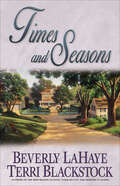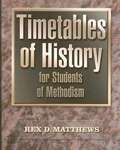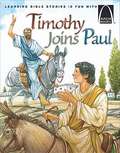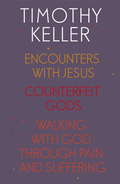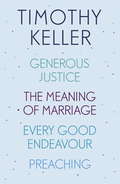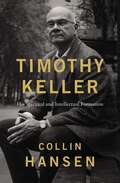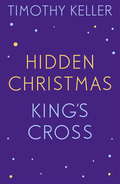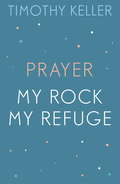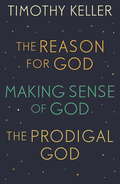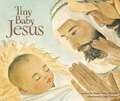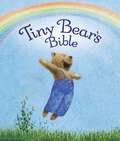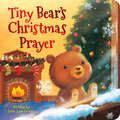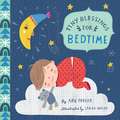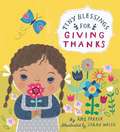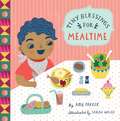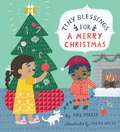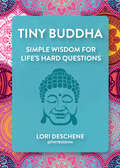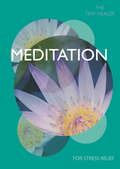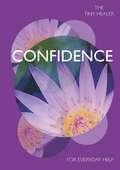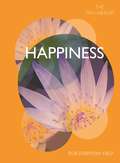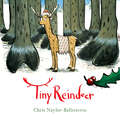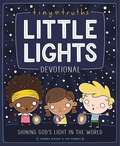- Table View
- List View
Times and Seasons: Seasons Under Heaven, Showers In Season, Times And Seasons, Season Of Blessing (Seasons Series #3)
by Terri Blackstock Beverly LaHayeWhen Cathy Flaherty&’s teenage son, Mark, is arrested for selling drugs, her neighbors once again show that Cedar Circle is more than a suburban cul-de-sac. It is a tightly knit circle of friends whose faith, love, and encouragement help each other make it through the changing seasons of life. More is at stake for Cathy than her son. With Mark in juvenile detention, the single mother of three finds herself struggling over whether to marry Steve Bennett, a man she truly loves. It will take strength and wisdom for Steve to see Cathy through this time of family conflict. Fortunately, he is not alone. Other lives, each with concerns of their own, weave together in a strong show of mutual care and support. And through the hands and hearts of this loving community, God moves.
Timetables of History for Students of Methodism
by Rex D. MatthewsWinner of the 2007 Saddlebag Selection Award from the Historical Society of The United Methodist Church as "the best book published during the year on the history, biography, polity or theology of United Methodism or its predecessors." Understanding history rests largely on a grasp of two things: sequence and context. Know which events came earlier and which later, and you've gone a long way toward understanding influence and causation. Know what was going on in the wider world at the same time a historical event occurred, and you'll better grasp the meaning and significance of that event for the people who experienced it. Yet even with the best history textbooks students have difficulty in gaining an immediate sense of sequence and context. Hence the purpose of this book: To lay out the most important events in the history of the Wesleyan/Methodist movement, to show them in their proper order, and to include the most important occurrences taking place on the national and international stages at the same time. Matthews presents his material in an easy to comprehend and visually appealing layout, enumerating the major trends and developments in Methodist history from 1700 to 2004. Rex D. Matthews is Assistant Professor in the Practice of Historical Theology at Candler School of Theology, Emory University, Atlanta, Georgia. He currently serves as co-chair of the Wesleyan Studies Group of the American Academy of Religion, as General Editor of the Kingswood Books series, and as Managing Editor of the new electronic academic journal Methodist Review. An excerpt from the Circuit Rider review: "This is a book for college and seminary professors, for high school teachers of religion, for Sunday School teachers of children, youth and adults. It is a book for preachers and church musicians. It should be in every church library. This is a book for people who think history is boring as well as for those who delight in rich historical detail and story. It is a book to be savored and returned to again and again. And this is a book for all who love the church and yearn to be part of perfecting its mission and its life." (Click here to read the entire review.)
Timothy Joins Paul: Acts 16:1-5, 2 Timothy 1:1-7, 2 Timothy 4:14-17; and 1 Timothy 1:3 for Children
by Erik RottmannThis book tells of Timothy joining Paul and Silas on Paul's Second Missionary Journey (Acts 16:1-5; 1 Timothy 1:3; 2 Timothy 1:1-7, 4:14-17). The Arch Books series tells popular Bible stories through fun-to-read rhymes and bright illustrations. This well-loved series captures the attention of children, telling scripturally sound stories that are enjoyable and easy to remember. Other Arch books are available in this library.
Timothy Keller: Encounters With Jesus, Counterfeit Gods and Walking with God through Pain and Suffering
by Timothy KellerEncounters with Jesus: Jesus changed the lives of nearly every person he met in the Gospels. These were powerful experiences that can have a profound effect on us today and help explain not only different aspects of Christianity, but the deep questions of life itself. Preaching: Timothy Keller is known for his insightful, down-to-earth sermons and talks that help people understand themselves, encounter Jesus and apply the Bible to their lives. In this accessible guide for pastors and laypeople alike, Keller helps readers learn to present the Christian message of grace in a more engaging, passionate and compassionate way.Walking with God through Pain and Suffering: The problem of pain is a perennial one; and for those who undergo particular sufferings it can often be the largest obstacle for trusting in a good and loving God. If such a God exists, why is there so much suffering in the world? And how do we deal with it when it comes into our lives?
Timothy Keller: Generous Justice, The Meaning of Marriage, Every Good Endeavour, Preaching
by Timothy KellerGenerous Justice - Keller explores a life of justice empowered by an experience of grace.The Meaning of Marriage - co-authored with his wife, Kathy, Keller turns his attention to that most complex of matters: our need for love, and its expression in marriage.Every Good Endeavour - Keller argues that God's plan is radically more ambitious than work being a means to and end: he actually created us to work.Preaching - known for his insightful, down-to-earth sermons and talks, Keller helps people understand themselves, encounter Jesus and apply the Bible to their lives.
Timothy Keller: His Spiritual and Intellectual Formation
by Collin HansenThe untold story of the people, the books, the lectures, and ultimately the God who formed and shaped the life of the late Timothy Keller.Millions have read books and listened to sermons by Timothy Keller. But who impacted his own thinking, and what shaped his spiritual growth and ministry priorities? With full access to Keller's personal notes and sermons—as well as exclusive interviews with family members and longtime friends—Collin Hansen takes readers behind the scenes of one of the 21st century's most influential church leaders.For the first time, Hansen introduces readers to Keller's early years: the home where he learned to tell stories from the trees, the church where he learned to care for souls, and the city that lifted him to the international fame he never wanted.This unique biography will allow you to:Understand the principles and practices that allowed Keller to synthesize so many different influences in a coherent ministry.Take the best of Keller's preaching and teaching to meet emerging challenges in the 21st century.Develop your own historical, theological, and cultural perspectives to shape your leadership. The story of Timothy Keller is the story of his spiritual and intellectual influences, from the woman who taught him how to read the Bible to the professor who taught him to preach Jesus from every text to the philosopher who taught him to see beneath society's surface.
Timothy Keller: King's Cross and Hidden Christmas
by Timothy KellerCombining two of Keller's most popular books about Jesus, readers are invited to explore the heart of the Christian faith.King's Cross - Drawing from Mark's gospel, Keller explains how Jesus' identity as king and his purpose in dying on the cross have meaning and significance on a cosmic scale as well as for the individual.Hidden Christmas - The New Testament begins not with a dramatic narrative or lofty poetry but with a genealogy. Provocatively, Matthew's gospel includes women in Jesus' family line - something that wasn't customary in an ancient culture, where women were largely powerless and uninfluential. In this surprising take on the Christmas story, Tim Keller reveals how, by focusing on the women in Jesus' birth narratives, a colourful, scandalous, and refreshing tale of grace emerges.
Timothy Keller: Prayer and My Rock; My Refuge
by Timothy KellerThis ebook combines Timothy Keller's two bestselling titles on prayer. Keller connects a deep understanding of the Bible with contemporary thought, as he addresses the subject of prayer and the daily reality of praying.Prayer: Prayer is central to Christian faith yet so many people struggle to pray. This wise and inspiring book is offers a real and glorious vision of what it can mean to seek God in prayer. Keller begins by giving a theological underpinning of what prayer actually is - both conversation and encounter with a personal God - before describing how we can learn to pray, and then deepen that prayer. Finally he gives detailed, practical suggestions on how to make prayer a part of the reality of daily life.My Rock; My Refuge: This devotional offers inspiration for every day of the year, based on the book of Psalms. Here Tim Keller helps readers apply the principles he laid out in his book Prayer: Experiencing Awe and Intimacy with God. He walks them verse by verse through the entire Psalter, the one biblical book designed to teach us how to pray, how to spiritually handle every possible life situation, and how to actually know God.
Timothy Keller: The Reason for God, Making Sense of God and The Prodigal God
by Timothy KellerThe Reason for God: this book has been written for believers and non-believers, sceptics and churchgoers, and charts a brilliantly considered and impassioned path to Christianity - a Mere Christianity for the twenty-first century.Making Sense of God: a prequel to Keller's A Reason for God: a thoughtful look at the role faith and religion can play in modern lives. The Prodigal God: focused on Jesus' best-known parable - the prodigal son - as a paradigm for the central messages of Christianity: grace, hope and salvation.
Tinderbox: U.S. Foreign Policy And The Roots Of Terrorism
by Stephen ZunesWill our democracy be defined by dominance? Or by the higher values we constantly espouse? This is the central question facing us in the wake of 9/11, and Stephen Zunes shows the prospects are not promising.
Tiny Baby Jesus
by Dandi Daley MackallTiny feet of Jesus, kicking up a storm. Angels circling round his bed keep him safe and warm. Now those feet are bigger, walking on the sea, Leaving us his footstep, saying, “Come and follow me!” Celebrate the gift of Jesus from head to tiny toes. Discover the wonder of hands that develop into those of a carpenter and swaddled shoulders that grow to carry the weight of all mankind. Share in the humble birth of tiny baby Jesus while remembering the life and teachings of the grown savior.
Tiny Bear's Bible
by Sally Lloyd-JonesAn adorable story Bible for kids 6 and under written by bestselling author Sally Lloyd-Jones. Tiny Bear&’s Bible is a warm reminder of how God loves his children. Together with their friend Tiny Bear, children discover eleven Bible stories wherever they go. The closing story leaves us with this loving reminder: &“No matter what, no matter where, God is with us, Tiny Bear.&” Sally Lloyd-Jones presents some of the most familiar Bible stories to children, which provides parents and grandparents lots of teachable moments as they explore God&’s love together. Sally Lloyd-Jones is a leading writer of inspirational books for children, with an expertise in conveying biblical truth to young children. She is the author of three bestselling children&’s Bibles, including the Gold Book Award–winning Baby&’s First Bible and The Jesus Storybook Bible. She has written many picture books for children, including Handbag Friends and Time to Say Goodnight. A native of England, Sally lives in New York City.
Tiny Bear's Christmas Prayer
by Lorie Ann GroverCelebrate the joy and peace of the Christmas season with Tiny Bear as he thanks God for all of the special blessings that fill his heart during the most magical time of the year!On a joyful, winter night,Tiny Bear feels all is right.Fire's warm as snow drifts by,sweeping white across the sky.In this new holiday board book, celebrate the joy of the Christmas season with Tiny Bear as he thanks God for each blessing that fills his heart. From singing Christmas carols, to sharing a special meal with his family, Tiny Bear is reminded that the true gift of the Christmas season was the birth of baby Jesus!A sweet Christmas read-aloud for parents to read with their children, this lovely story will help instill values of faith and gratitude into their children's hearts. A joyful story to share as a family and perfect for holiday gift-giving!
Tiny Blessings For Bedtime
by Amy Parker Sarah WalshSweet, simple bedtime blessings that encourage thoughtful gratitude for life's daily gifts and wonders. Before going to bed, this warm, gentle board book instills the routine of reflecting on one's daily blessings. With its padded covers and intimate size that's perfect for small hands, parents and little ones will love snuggling up together as they cherish special moments from their day.
Tiny Blessings For Giving Thanks
by Amy Parker Sarah WalshSweet, simple blessings that encourage thoughtful gratitude for life's daily gifts and wonders. This accessible, wholesome board book is perfect for teaching babies and toddlers how to count their blessings every day. With simple, graspable text that inspires mindful thinking, and warm, vibrant illustrations, For Giving Thanks will fill children's minds with positive thoughts and help them appreciate life's special gifts.
Tiny Blessings For Mealtime
by Amy Parker Sarah WalshSweet, simple blessings that encourage thoughtful gratitude before mealtime. Food provides many blessings like helping us grow up strong, filling our house with yummy smells, and bringing us together. Let's give thanks for the food we eat! With thoughtful verse and illustrations that highlight the warmth of home, parents and children will delight in the simple blessings included in this sweet padded-cover board book.
Tiny Blessings For a Merry Christmas
by Amy Parker SArah WalshSweet, simple blessings that encourage thoughtful gratitude during Christmastime. Christmas Blessings are everywhere . . .in the twinkle of sparkling lights, in dreams of glistening snow, with family around the table. Let's be thankful for the peace and love this time of year brings! Parents and children will enjoy these simple blessings and creating new holiday memories with this sweet padded-cover board book.
Tiny Buddha: Simple Wisdom for Life's Hard Questions
by Lori DescheneMeaningful Answers to Hard Questions “Tiny Buddha is a moving and insightful synthesis of evocative stories and ancient wisdom applied to modern life. A great read!” — Jonathan Fields, author of UncertaintyFrom the mind behind TinyBuddha.com, Lori Deschene brings us the latest edition of her guide to peace, purpose, joy, and more! Exploring the challenging questions we all have to answer for ourselves, Tiny Buddha can be your handbook to personal fulfillment.You are in control of your purpose. Life has a way of giving us more questions than answers. And despite our many differences, we all ask ourselves the same things, starting with: Why am I here? Featuring varied perspectives from Twitter followers around the world, Tiny Buddha can help us choose the meaning behind our existence and find purpose in our pain, no matter how deep.Uncertainty can be a good thing. Offering straightforward, practical advice and pieces of her own personal journey, author Lori Deschene breaks down hard yet revealing questions about life, love, happiness, and change. We may have very few concrete answers, but that means we each get to decide for ourselves what it all means and what happiness looks like for us. Let Tiny Buddha help you create and honor that vision.Inside, you’ll find:The difference between searching for meaning versus creating it ourselvesEmpowering ways to answer the question “What is happiness?” and how to create itThe importance of accepting your struggles without fully understanding the “why”How to find mental freedom by letting go of controlIf you like self-help books or advice blogs, or if you enjoyed Living on Purpose, The Soul’s Human Experience, or The Tao of Influence, then you’ll love Tiny Buddha.
Tiny Healer: A Pocket Guide to Inner Peace (Tiny Healer)
by A. J. MacselfMeditation is an indispensable tool for daily living. It can sharpen the mind, balance the emotions and even help you understand the mysteries of life.Whether you are a beginner or have been meditating for some time, this little book offers a collection of simple and effective meditations and words of inspiration to enrich your daily life and deepen your spiritual practice.Chapters:INTRODUCTION HOW TO START MEDITATIONS FOR BODY, MIND & SPIRITMEDITATIONS FOR LOVE & COMPASSIONMEDITATIONS FOR PROBLEM SOLVING
Tiny Healer: Confidence
by PyramidEveryone deserves to feel confident in their daily lives, but maintaining self-esteem and overcoming fear is easier said than done. Tiny Healer: Confidence will give you the boost you need to start tackling your worries. Keep this pocket guide close by to improve your daily confidence.
Tiny Healer: Confidence (Tiny Healer)
by PyramidEveryone deserves to feel confident in their daily lives, but maintaining self-esteem and overcoming fear is easier said than done. Tiny Healer: Confidence will give you the boost you need to start tackling your worries. Keep this pocket guide close by to improve your daily confidence.
Tiny Healer: For Everyday Help
by Madonna GaudingWe all long to have happiness in our lives, but what does 'happiness' mean and how can we achieve it? With myriad ways to distract ourselves in our modern-day environment, it's easy to overlook what truly brings us joy.This Tiny Healer will help you overcome any barriers on your journey to true happiness, providing tips for everyday habits as well as ideas to embrace in the long-term.
Tiny Healer: For Everyday Help (Tiny Healer)
by Madonna GaudingWe all long to have happiness in our lives, but what does 'happiness' mean and how can we achieve it? With myriad ways to distract ourselves in our modern-day environment, it's easy to overlook what truly brings us joy.This Tiny Healer will help you overcome any barriers on your journey to true happiness, providing tips for everyday habits as well as ideas to embrace in the long-term.
Tiny Reindeer
by Chris Naylor-BallesterosTiny Reindeer is too small to pull Santa's sleigh. Will he figure out a way to prove his worth before Christmas day? A sweet Christmas picture book for fans of When Santa Was a Baby and Dasher.Santa and his reindeer are getting ready for Christmas, but Tiny Reindeer is too small to join in! Santa knows that a nudge in the right direction could change Tiny's life forever. When Tiny discovers a letter from a bereft little girl who is wishing for a tiny reindeer to match her grandfather's final gift, a hand-carved tiny sleigh, Tiny realizes that this might be his big chance. But will he have the courage to take a (literal) leap into the unknown? And what can Santa do to help?This picture book is a sweet, funny and heartfelt look at being different and feeling too small to matter, and reassures readers that even the smallest gift -- whether it's a tiny reindeer or a seemingly small opportunity to help -- can bring lots of joy.
Tiny Truths Little Lights Devotional: Shining God’s Light in the World
by Joanna Rivard Tim PennerThe Tiny Truth Little Lights Devotional is a collection of more than 60 accessible, Scripture-based reflections reminding children they are the lights in God&’s world. Deepen your child&’s faith through fun-to-read devotions that remind kids of God&’s deep love and inspire them to let God&’s light shine in ways both big and small.This fun and engaging devotional contains short reflections about loving God and our neighbors, forgiveness, right and wrong, finding joy in sadness, how to be grateful, and many more child-friendly themes!Tiny Truths Little Lights Devotional:Includes more than 60 devotions speaking directly to children ages 4–8Features Scripture verses highlighting God&’s light in the worldContains illustrations celebrating diversity in our worldCan be a companion to The Tiny Truths Illustrated Bible and Tiny Truths Wonder and WisdomIs perfect for starting your day, family dinnertime, bedtime reflections, or making a quiet moment in a busy day The Tiny Truths Little Lights Devotional will help your child learn:Who God is—the one who made everything and everyoneWho we are—his children, whom he loves unconditionally What we were made for—to love God and everyone
